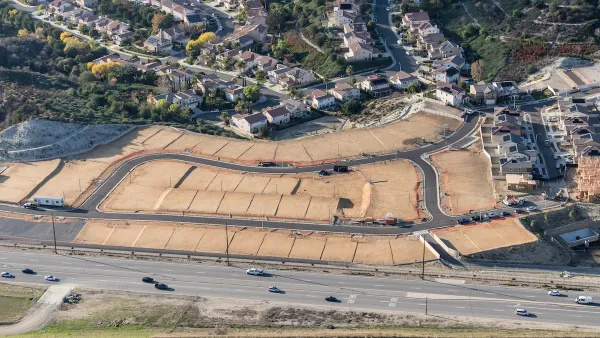If the 43-year-old California Environmental Act is going to be changed - as Gov. Brown hopes, most agree the legislation will be championed by Michael Rubio, a young, moderate Latino Democratic in the second year of his first term in the senate.
Torey Van Oot writes about 35-year-old Senator Michael Rubio's desire to reform California's landmark, but now controversial environmental law. Rubio first got wind of CEQA issues as a Kern County supervisor "when he saw it used to slow wind and solar projects he considered green by their very nature."
Making changes to "modernize" the law, a process he compares to updating an outdated iPhone app, is in Rubio's view "the most important issue facing California today."
Anne C. Mulkern, E&E reporter notes in her newsmaker report (subscription) on Rubio that Kern County's "top industries are oil production and agriculture, but Kern County also led the state last year in renewable energy development. It approved seven times more wind and solar than the next closest county."
As chairman of the state Senate's Environmental Quality Committee, Rubio is in a prime position to attempt to act. He can likely count on help from Gov. Jerry Brown who had "reiterated his desire to modify California's signature environmental law, the California Environmental Quality Act, and to overhaul the state's K-12 funding system to give more money to districts with poorer students" in his State of the State speech on Jan 24, as The Bee noted.
Since joining the Senate in 2011, Rubio has gained a reputation as one of the upper house's more moderate Democrats. The move on CEQA puts him at odds with many of his colleagues, as well as interest groups representing a key Democratic constituency: environmentalists.
An unsuccessful effort spearheaded by the Silicon Valley Leadership Group described here to reform the law arose at the end of the legislative session last year. Previously, small changes to CEQA were accomplished legislatively by making specific exemptions. While all three bills in 2011 were chaptered, they encountered varying degrees of opposition from the environmental community, suggesting that that a major revision of CEQA will indeed be difficult.
According to Derek Moore of The Press Democrat, Rubio could be facing off against fellow Democratic Sen. Noreen Evans of Santa Rosa.
Gov. Jerry Brown and Democratic Party leaders in both houses of the state Legislature have stated their willingness to change the law. So far they've not released specific details.
State Sen. Noreen Evans, D-Santa Rosa, has emerged as a major player in the debate as a defender of the status quo, or even adding more provisions to the law that in some instances would be anathema to business interests.
Evans penned a passionate defense of the landmark environmental law in Capitol Weekly on Jan. 29.
CEQA was designed to give a voice to local people in local planning decisions. It ensures that residents in every California community can understand how land use decisions will impact shared resources – like clean air, clean water, open space, and traffic flow – and public health. It also empowers community members to hold public agencies accountable to local and state environmental laws....
Regardless of whether Rubio prevails in his effort to take on fellow Democrats and reform a law whose defenders believe does not need reform, it's clear that Rubio has already made a name for himself among his fellow Democrats.
While (Senate President Pro Tem Darrell) Steinberg didn't agree with Rubio's approach on CEQA last year, he said he admired his colleague's willingness to stick his neck out on the issue. He said he expects Rubio to become a "force and an excellent policymaker as the years progress."
FULL STORY: Moderate Michael Rubio takes on California's environmental law

Maui's Vacation Rental Debate Turns Ugly
Verbal attacks, misinformation campaigns and fistfights plague a high-stakes debate to convert thousands of vacation rentals into long-term housing.

Planetizen Federal Action Tracker
A weekly monitor of how Trump’s orders and actions are impacting planners and planning in America.

In Urban Planning, AI Prompting Could be the New Design Thinking
Creativity has long been key to great urban design. What if we see AI as our new creative partner?

King County Supportive Housing Program Offers Hope for Unhoused Residents
The county is taking a ‘Housing First’ approach that prioritizes getting people into housing, then offering wraparound supportive services.

Researchers Use AI to Get Clearer Picture of US Housing
Analysts are using artificial intelligence to supercharge their research by allowing them to comb through data faster. Though these AI tools can be error prone, they save time and housing researchers are optimistic about the future.

Making Shared Micromobility More Inclusive
Cities and shared mobility system operators can do more to include people with disabilities in planning and operations, per a new report.
Urban Design for Planners 1: Software Tools
This six-course series explores essential urban design concepts using open source software and equips planners with the tools they need to participate fully in the urban design process.
Planning for Universal Design
Learn the tools for implementing Universal Design in planning regulations.
planning NEXT
Appalachian Highlands Housing Partners
Mpact (founded as Rail~Volution)
City of Camden Redevelopment Agency
City of Astoria
City of Portland
City of Laramie




























